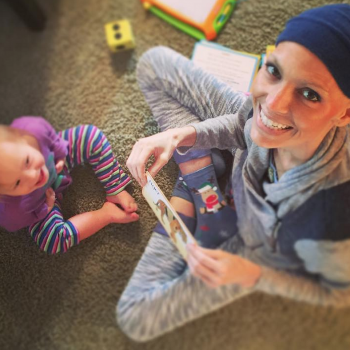
When my husband David joined the Army and was deployed to Iraq, there were certain… implications. For one year, I would be without someone to change the lightbulbs, help with the carpool line, or talk to me at dinner about anything beyond the ups and downs of elementary school life.
Oh, and it also meant no sex.
For a year.
I often think of those 365 days when sitting with Christian friends who have not married or who have been widowed.
“How can I give up sex,” they ask, “maybe forever?”
The question — the lonely, hungry question — makes my one year look insignificant in comparison. There are no easy answers.
Fabienne Harford is a single woman who longs for physical intimacy. Being a Christian, as we all know, doesn’t mean you suddenly don’t have desires or needs. In fact, these desires might even become more pronounced… like the bum tooth that your tongue keeps finding, no matter how much you try to ignore it:
I have spent so much time trying to remove the struggle; thinking that the day this didn’t hurt would be the day I most honored God, that removing the temptation would be the sign of God’s blessing. But our God seems to be in the business of blessing us, not in spite of suffering, but through suffering. I believe that one day, I will look at my life and say with confidence that one of the greatest blessings I have experienced and gifts that I have given to others has been the pain of learning to live without physical intimacy.
There is pain in watching my friends be fed one after another with the thing I hunger for the most. There is pain in facing each morning with the knowledge that today there will be no daily bread for this hunger. There is pain as I sit, feeling as though I am starving to death, and listen to my married friends try to explain that such eating is overrated.
So how does she process her singleness coupled with desire? This is where her point gets really interesting:
The pain of missing out on physical pleasure in this life holds out to us the gift of longing for the next life. Foregoing the earthly shadow by faith because we believe so much in the heavenly reality. It might be that the pain of a life without physical intimacy was part of what equipped Paul to proclaim through the Spirit that to die is gain. To die is to gain a glorified body that feels and experiences the truth that all our needs are met in Jesus. To die is to gain the heavenly reality that earthly intimacy can only reflect in shadows. To die is to gain full oneness with God, fullness of joy, and pleasures forevermore.
The whole article is worth a read. However, here is the bottom line for Harford:
There is almost nothing as strange and painful as the act of choosing to trust God over the very fiber of your design. It’s a pretty hard sell to get your body on board with the idea that you’re not missing out on what you were created to enjoy. It’s challenging to not feel entitled to sex. In fact, it’s one of the things that has made it the hardest to trust my sweet and faithful God. And in some ways—in dark and frightened places—I feel forgotten and betrayed and confused because I know he knows me. I know he knows my body and my heart, and I know he designed and wired this desire inside of me in the same way he wired my belly to grumble every morning around 11:02 a.m. My hunger is designed to prompt me to eat. So I do. Yet my Father has told me that when I am hungry in this sense I must trust him and not find food for myself. And he has seen fit not to give me any guarantee that this hunger will ever be satisfied in this life.
Yet this struggle has taught me to value hunger; to embrace it as a means of getting God, rather than thinking of this hunger as an enemy. It’s like fasting. God commands us to fast, but not so that he can prove he is as good as a cheeseburger by making our hunger go away. The goal of fasting is not for God to remove our hunger, but for us to learn that in the midst of hunger he is trustworthy. The feeling of hunger is the point of the fast. It teaches us to hunger for something better.
Today, my body wants something tangible and physical that it was designed to have. And today, I don’t get to have that thing. Of course my body grumbles, and as it does, I get to testify that in the midst of my hunger, God is trustworthy. I’m learning to hunger for something better.
May we all hunger for something better than what this world has to offer – whether we’re married or single.
Read more on the Patheos Faith and Family Channel and follow Nancy on Facebook, Twitter, and Instagram!









